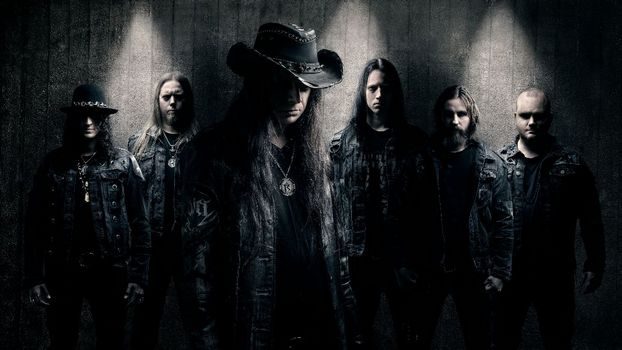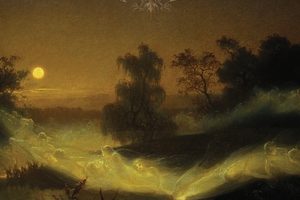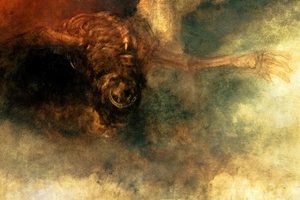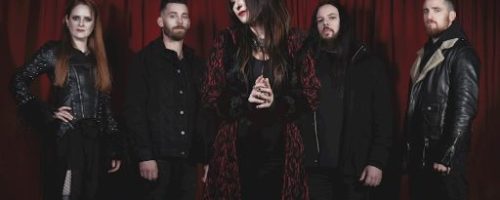Netherbird – Freedom in Darkness
Friday, 25th October 2019
When it comes to capturing the essence of that older school of melodic black and death metal, there’s not exactly a large number of go-to acts in 2019. But one band that has been consistent in their efforts is that of Netherbird. Perhaps in part due to their pedigree of growing up with the sound and having a passion for it, as well as playing since the early 2000s, but Netherbird pulls the melodic darkness that made the Scandinavian meloblack/death scene so vibrant with genuine flair. With their excellent fifth album, Into the Vast Uncharted in tow, we spoke with vocalist Nephente [Johan Fridell] to get a better understanding of the band, from the ground up.
Dead Rhetoric: This is going back a bit, but where did the name originally stem from?
Nephente: Netherbird is a constructed word, and I had the notion of trying to find a name for the band that wasn’t connected to a specific genre, like black or death metal. I wanted something more neutral. We didn’t know then, and we don’t 100% know now where we are going, but I wanted something that would express the idea of the band, which is freedom in and through darkness.
Netherbird is a construct of ‘nether’ and ‘bird’ so darkness but also freedom of movement. So we put them together, and it was the early 2000s…2004. So we tried to find something that also hadn’t been used 100 times before. That happened to me a lot in the ‘90s. I had bands called Sickness and Benighted. Pretty generic stuff [laughs], so we tried to get something that stayed clear of that.
Dead Rhetoric: What does Into the Vast Uncharted do best for Netherbird?
Nephente: As a band, we have been progressing for 15 years. The more established we have become, the more secure we feel. Hence we try less and less to impress people. We have dug deeper into our roots and the music that made us. It tends to be albums from the ‘90s – from the black and death metal Scandinavian scene. A lot of Unisound stuff. I think on Into the Vast Uncharted, we really let go and just played songs that came honestly and naturally to us. They are reminiscent of bands in the ‘90s because that’s in our blood. That’s where we come from.
I think this album is a very honest one in that sense. We just let our influences materialize on this album. It’s a little more to the point, and the songs tend to be a little bit shorter and carry more punch. That is also because we felt we needed, I wouldn’t say simpler, but maybe more focused songs that are a little bit easier to convey in a live setting. That’s also something that this album brings to the table – a few songs that are more live ready than our previous stuff.
Dead Rhetoric: How do you describe the band’s merger of sounds, other than what we just described in the older Scandinavian scene? What’s the songwriting process like?
Nephente: Every band tries to avoid labels, yet we always have to use them in order to express something as complicated as art. I remember we were meeting with a record label and they asked what our band was. I said that it was the natural meeting between Bob Dylan and Emperor. Of course, the silence was deafening, and I realized I made no sense. What I meant was that we use profound lyrics, and our musicscape is early ‘90s metal. But tying into your question, I’d say we are a heavy metal band. We play really harsh and crude heavy metal, so there are a lot of elements of black, death, as well as some thrash and doom.
Our progression is coming from the fact that Bizmark and I, we always used to write the songs back in the day, and we still do. Now we are more of a solid, full line-up, so there might be more people contributing to the songwriting. But so far, it’s me and him. Basically, he comes up with the basic riffs, or a pool of riffs, and we arrange them into a song. The way that we sound is the trade-off between his way of playing stuff – he is really musical and proficient with a lot of instruments, and I am a really crude, old school death metalhead. Netherbird is the result of him doing the most primitive stuff that he can, and me doing the most elaborate stuff that I can. Netherbird is where we meet.
As we progress, so does the band. We never set out to be black or death metal, we just set out to make really dark music. We could do more acoustic stuff in the future, I don’t know. I do know that we try not to make the same album twice. The next album will be different, but I cannot say if it will be more blastbeats or less yet…it is not yet written.
Dead Rhetoric: You just mentioned the profound nature of the lyrics- could you talk about the importance of lyrics to the band’s overall identity?
Nephente: I’m blushing a little bit if I could – I just said that the lyrics are profound and I write them [laughs]. Those are big words [laughs]. I don’t expect a Nobel Prize like Dylan, but what I try to do, and have always done, is make lyrics that are more open-ended and are like reflections. They are not pointing people how to behave, or how to think, or anything. I try to write existential reflections about stuff, like the human condition. The fact that we are alive in a very confusing time, and that existence is mainly a painful one that we try to make sense out of.
We always use stories to convey various emotions, ideas, or concepts, and I have tried to tie into that writing very different things – I use a lot of metaphors. When I do my job well, which happens, I think that the listener can find their own meaning or their own truth. Sometimes I fail of course, and the lyrics become bland and shallow. It happens. It’s a tough job, but I tried to do something a little bit different than perhaps what I did 20 years ago, when I was more into darkness and death. There still is darkness and death, but I try to paint it with different colors I suppose.
We have three pillars: the music, which should stand by itself. You shouldn’t have to analyze the lyrics to like it. We are a metal band after all. But then there are lyrics for those who are interested, and they could maybe find something there. Then there is the artwork. Those three pillars are equally important, but the music comes first. We are a guitar-based heavy metal band.
Dead Rhetoric: Funny you mention the artwork, because that was next on my list. There seems to be an epic scope to your last few albums at this point. Is that something you shoot for each time?
Nephente: Yes – I mean I am a megalomaniac. Everyone is who makes music and wants to put it on a stage for people to be inspired by. I have some Julius Caesar complex, as many artists I suppose. But the artwork tends to be more abstract. Like the lyrics, they are trying not to be too obvious or to crudely point people in a direction. So we go to the classic art – I try to find art pieces that fit the theme of an album. I have the song titles and music, but normally I don’t know what the album is going to be called until I encounter the right art piece. When I find the right art piece, then I know what the theme will be, and I put the title on it. Perhaps that is a bit more evident with our last three albums. The title and the artwork are pretty tied together in some sort of way.
Dead Rhetoric: How did you end up signing with Eisenwald?
Nephente: We have been releasing stuff on our own label and through a licensing deal with Black Lodge Records, and it had been working out fairly well for several years. But we have been looking for a label that is a bit more niched in more obscure metal. When we did this album, we asked a lot of labels, and had 5 or 6 respond with interest. Of those, Eisenwald is the one that convinced me with their vision and how they want to work with music. They are still passionate about the albums they put out. Not all labels are – it’s a business right? I get that. But as obscure band, we need a label that is focused and passionate about the music. We cannot guarantee them a wealth of income. They have to really like what we are doing or it makes no sense.
Eisenwald came across as the passionate partner we were looking for, and they have some amazing bands on their roster. There’s a long list of bands that I think have integrity, and that are really adding something to the scene. That also made the choice either, and plus, they wanted to collaborate with us [laughs]. It’s not like we can find any label, so we needed one that wants to do shit with us. I must say that I’m extremely pleased and a little bit overwhelmed by the hard work that they put into the release. It’s quite cool.
Dead Rhetoric: Being that the band’s a bit more obscure, what has pushed you along all this time? Like you said, the band has been around since the 2000s.
Nephente: I guess we don’t live off metal. We work, just like all metal bands do. We do this as a passion, so we do it because it gives us so much. We are all enthusiastic metal fans – go to many gigs like other metal appreciators, but we also play a bit. We think it’s fun, and it gives us a lot of satisfaction. We are pretty successful in a sense, because people listen and actually give a fuck about our music. So I’m pretty pleased with where we are at. With each release, we are slowly reaching more and more people. Of course, I’d be delighted if we could reach more, but we are in no hurry.
We see this as more of a marathon. I’ve been doing extreme metal since 1990, and I don’t see myself quitting any time soon. I’m not in a hurry to go anywhere. We focus on writing relevant albums and putting them out, and hopefully grow the band with each release. We are like cockroaches, it’s impossible to kill us [laughs]. We’ll stick around, but with each release, I get more and more feedback for listeners. We are okay with being obscure. We’d rather be obscure rather than compromise in any way, so we are good.
Dead Rhetoric: What do you enjoy about that older melodic black and death metal sound?
Nephente: All of it [laughs]! It’s a little bit like asking a fish how they like water. It’s all around them and they take it for granted. You’d be pretty dead without it. I’m marinated in that shit. I grew up with it, and I’ve been playing in extremely obscure bands for almost 30 years. It’s the reference for everything I do. Every album I hear, I will compare it to Dissection or Unanimated or Vinterland…all of this old stuff. Also, there’s American death metal. All of that extreme metal from the early ‘90s.
For me, that’s scary in a bit – I’m still waiting for music to be much better, and change my references. But it seems to me that I’m so deeply colored in it – I try to listen to new stuff, and I do, but whenever I create, I tend to go back into the sense of melody, especially the Scandinavian extreme metal that is very based with the tones…it’s like folk music. It runs really deep in the nature-worshipping culture of Scandinavia. It’s just different instruments, but a lot of the songs have hundreds of years of history in a sense. So the tones, they just come naturally.
Like [fish in] water, it’s hard to describe what I have been in and what I am breathing – so this is a bit of a cloudy answer to a precise question but in a way I don’t know much different, and I don’t want to know too much different. That said, yes I listen to music released after 1994, but I tend to still compare it to The Somberlain or whatever. It’ll always be the same.
Dead Rhetoric: I think that’s the same for everyone. We all have those initial reference points. I know I do those things either consciously or unconsciously myself.
Nephente: We are all humans, and we need those frames of reference in order to make sense of the world because it’s so fucking complex. I think this is a hobby, but I think that the music that we listen to when we are 16 or 17, it tends to be the music that sticks with us. It’s different for someone who is 17 today and hearing the completely mad, modern death metal. They will have a different frame of reference and that’s fine. I think music touches us in those years that it seldom does later on. I think that’s what makes it stick so well…I’m not sure.
Dead Rhetoric: What have been some of your favorite moments with the band?
Nephente: Every live gig that is a success – it condenses every hour of hard work. When you are on stage and meet an enthusiastic crowd, it doesn’t have to be big, but if they are into what you are doing…you can’t buy those moments from a travel agency. You have to work for it. When you end up in some obscure bar and you end up playing for 50 or 100 people who give a fuck, then it all makes sense. Those moments are the most vivid to me. When the band and audience explodes, it’s pure magic, and the reason that extreme metal is so awesome I think.
Other than that, signing to a label that we really like, which is recent, that’s a cool accomplishment. It’s about when the music matters to someone. When someone writes to me and has a thought or idea, or even a comment about what they read, that’s also really cool. That happens every now and then. These days, with social media, we work hard on Facebook and shit, but I kind of miss the Myspace days when we actually reached people and were talking music. Facebook is a fucking fraud in a way, because we have like 26K likes, and whenever we post it reaches 50 people if we don’t pay for it. We don’t see so much conversation or end up reaching many new people there. That sucks. We feed off what people experience when they listen to our stuff, so we want more of that. But then, everybody does.
Dead Rhetoric: What’s coming up for the band in the next 6 months or so?
Nephente: Bizmark, who is like my old partner in crime, has moved to England so we live in different countries currently. He will do so for at least a year. It won’t change much, but we will take it a bit slowly with live gigs in the autumn. But we will try to do way more gigs next year. In the meantime, we will write the next album. I think we will do that in November/December. We tend to write an album pretty quickly, but it takes more time to record it and get it out. I think maybe 2021 we will have a new one.
So we try to stay creative in that sense, then next year we will try to pick up speed with live gigs. If it happens, it happens, otherwise there’s always next year or the year after. It’s so hard to get gigs actually. You can always do the ‘van tour’ in Europe, but if you want to be more selective, it is quite hard. So there won’t be 100 gigs, but 20 or 30 would be cool.
























